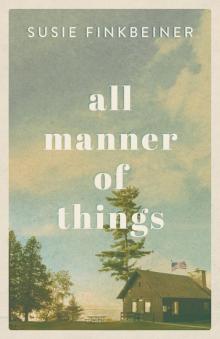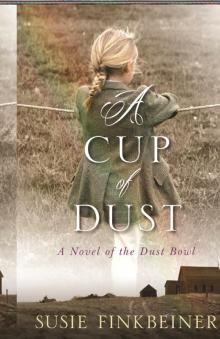- Home
- Susie Finkbeiner
Paint Chips Page 3
Paint Chips Read online
Page 3
“Okay.” I sat up. “What do you want me to make?”
“The works. We have all the ingredients.” Lola put her hand on my cheek. “You are a precious princess for getting up early to make breakfast for Jesus.”
“Yeah, yeah. It’s too early for that kind of chipper talk.” I stood, stretched and tried to smile. “Did you happen to make coffee?”
“I surely did,” she said.
In the kitchen, I started frying up bacon, baking coffee cakes and cinnamon rolls. I cut thick slices of homemade bread for toast. Sourdough. My mom’s favorite. She used to bake it for my big brother and me. The smell of that bread brought memories of her pulling the loaves out of the oven. It made me miss her.
Whenever I cooked I felt connected to my mom. She spent most of my childhood in her kitchen whipping up something. She let me help. Taught me all the basics. Never got upset when I made a mess of her kitchen. Those were loving, warm memories.
About a year after I moved to Lola’s house I started making breakfast every Saturday. I always wore the apron my mom made for me. By the time I finished cooking, I’d get it dirty with smeared egg or dusted with flour. Somehow my mom’s apron never got dirty no matter what she was making. I could never figure out how she did that. Or why she even needed to wear an apron in the first place.
“Sugar, you need some help makin’ breakfast?” Peace yawned, entering the kitchen.
“Yeah, that would be great. Thanks.” I handed her some eggs and a measuring cup of milk. “Would you please whisk those up for me?”
“It ain’t Saturday, is it? Don’t you only do these breakfasts on Saturday?” she asked, grabbing a mug of coffee.
“Nope. Lola’s bringing home another girl.”
Nodding her head, she stirred cream into her coffee. I always thought her skin looked like milky coffee. She wore her dark brown hair twisted into tight cornrows. Her brown-green eyes were framed by the longest lashes I’d ever seen.
A tattoo marked up her neck. Her pimp’s brand. So ashamed of it, she hid it whenever she could. When she felt like someone was looking at it, she covered it with her hand.
“Hey, you want me to add cheese to these?” she asked, beating the eggs.
“Sure. Thanks.”
A few hours later we all sat in the living room, stomachs full and the dishes washed. Lola on her rounds to deliver leftovers to our neighbors.
Promise, the new mother, sat in a recliner. She held the baby, Nesto, loosely in her arms. A receiving blanket tucked around him tightly in a swaddle. Yellow ducks and green frogs all over the soft fabric. Every few minutes he’d squawk, spitting out his pacifier. Every time, Promise shoved it back into his mouth.
“So, what’s it like?” Grace asked. “I mean, bein’ pregnant?”
“It ain’t fun, you know,” Promise said, chomping on a piece of gum. “You get all fat. I got stretch marks all over my belly now. Ain’t gonna be wearin’ no bikini no more.”
“But it was worth it, right?” Grace asked. “I mean, you got a baby.”
“I guess. I didn’t want to have no baby. But I didn’t know I was knocked up till it was too late to get it aborted.” She stood up. “Listen, I gotta go get a nap. I’m gonna put the baby in the swing down here. If it cries, just give him a bottle or something.”
She went up the stairs and to her room. The rest of us took turns holding Nesto. He was a sweet baby. We gladly welcomed him into our home.
Holding Nesto in my arms, I remembered my dad. Climbing up into his lap.
“Daddy,” I would say, snuggling up to him. “Tell me about when I was a baby.”
“Well,” he had said, wrapping strong arms around me. “You were beautiful. Just like you are now. But so small.”
“Tell me the story about my name,” I would beg. “Please, Daddy.”
“Again? Aren’t you tired of that story?”
“No. Tell me.”
“Oh, okay,” he had said.
Listening to the story, I would bury my face in his chest, smelling his cologne.
~*~
My dad drove their station wagon home from the hospital. My mom sat in the back with me. He’d never driven so slowly in all his life. Not even when taking my big brother Pete home. Something about a baby girl seemed more fragile. Made him more cautious.
Two-year-old Pete met us at the door. My grandparents, from Oregon, had our apartment decorated with pink balloons and streamers. A banner, hung across the living room, read Welcome Home, Baby Girl Schmidt!
I didn’t have a name yet. They couldn’t think of anything they both liked.
Dad held me so that Mom could eat. I slept so deeply and stayed so still he kept checking to make sure I was breathing. Every once in a while I smiled. He knew it was gas, but that didn’t make it any less special to him.
“What are you going to name that baby girl?” my grandmother asked, plopping more mashed potatoes on my mom’s plate. “She can’t go on forever without a name.”
“Well, we just aren’t sure yet.” My mom pushed the extra food away.
“What about my name? Delores. I think that’s a nice name.” My grandma pushed the plate back to my mom. “Why don’t you name the baby Delores? Wouldn’t that be special? And, Cora, if you don’t start eating more your milk’s never going to come in.”
“I’m full,” my mom had said, picking up the plate and putting it in the kitchen sink.
“You know, I would be honored if you named the baby Delores.”
“Delores means sorrowful, painful,” my grandpa said, flipping through a baby name book. “That’s not a nice name.”
“Nobody would know what it means,” my grandma had snapped. “Normal people don’t carry those ridiculous name books around. Besides, I’ve lived my whole life with that name.”
“And you’ve lived up to it every day.” Grandpa turned to the next page. “Oh, how about Dorothy? It means ‘gift from God.’”
“I don’t know. I like the meaning, I’m not so sure about the name,” Dad said. “What about Dorothea?”
“That’s a pretty name,” my mom said, taking me into her arms. “Dorothea Schmidt.”
“It says here the nickname is Dot,” Grandpa read. “That’s cute.”
“Well.” Grandma slumped into a chair. “I think it’s awful.”
~*~
Nesto in my arms, I tried to imagine being held again by my dad. The thought made my heart achy and my eyes water. I kissed the little baby boy on the forehead, hoping for happiness and love to enter his life.
Cora – 7
I hated Wednesdays in the institution. Every Wednesday morning, the art therapist showed up for an hour filled with silly activities. She reminded us weekly that art helped us connect with our emotions. The only emotional connection I made in that class was frustration. I sat at the table in the dayroom, waiting for the class to be over.
“Time to let you feelings breathe,” sang Sunshine Ruffman. She danced around the room passing out large pieces of paper to each of us. “Art has the power to heal the soul!”
She swirled, art supplies flying from her hands like so many seeds. Crayons here. Markers there. Her long scarf flowed behind her in a ballet of colored drawing implements. Tightly ringed black hair bounced as she pirouetted. At last, she perched on a stool, crossed her legs and inhaled deeply. She closed her eyes and let her fingers wiggle in the air.
“Friends, the time has come.” Her nostrils flared. Her hands clapped together and she opened her bright blue eyes. “Create!”
Wesley scribbled, using dark crayons to create distorted, terrifying images. Stewart made stick figures with large, misshapen heads and limbs that sprouted from the chin and where ears should have been. Edith didn’t move, didn’t make a noise.
I sat before my paper each week wishing I could make something beautiful. I longed for my hand to craft pictures of family or rainbows or flowers. I yearned deeply to put the beauty I remembered into a piece of art. But all I could manag
e were dark, thick, ugly lines. I couldn’t make a single pretty thing.
~*~
Steven and I married on a beach along the shore of Lake Michigan. I had convinced him to run away with me. Sunbathers witnessed our vows which were officiated over by a chaplain friend of Steven’s.
Throughout the short ceremony, I couldn’t take my eyes off him. It didn’t matter to me that the sun peeked perfectly from behind thick clouds. Or that the waves dared to reach just up to our toes on the sand. I credited the perfection of the day to one thing—that Steven Schmidt loved me.
On that day, I determined that I would never need anyone else. He became sufficient to fill all my desires, all that I required.
After the ceremony we walked down the beach, scuffing our bare feet in the soft sand. I grabbed hold of his arm, knowing that as long as he lived, I would be safe. Protected.
I turned my face up to look at him. Only a year before, I’d seen that off-center smile for the first time.
“I can’t believe we just got married,” he said, eyes wide. “We should call our parents.”
“Your mother will be shocked, won’t she?” I laughed.
“She’s going to be furious, that’s what she’ll be. She has always wanted to plan my wedding.” He kissed my hand. “I’m glad we ran away to do this. It is so much more peaceful this way.”
“Is she really going to be angry?” I wanted her to like me. “Will she blame me?”
“Yes. Probably. But she’ll get over it. She’ll have plenty to do when she plans our reception.”
“She’ll do that?”
“It’s the least we can have her do.” He laughed. “It will be insane. Way too many people and way too much food. And the presents will be overwhelming.”
“I wouldn’t have it any other way.”
He stopped and kissed me. “I love you so much, Cora Schmidt.”
“Oh my goodness! That’s my name now, isn’t it! I’m never going to be able to get used to it.”
“You know, I feel pretty bad. I never thought I’d marry a girl without asking her father’s blessing first.”
“Well, life sure can have some surprising twists.” I gazed up at him. “Don’t worry about all that. Trust me. It’s better this way.”
“Could we at least give everyone a call? It would make me feel better.”
My heart contracted with anxiety. I didn’t know how to tell my husband of one hour that our elopement had a purpose. That I would never call my father. And, so, I chose not to burden Steven with the information.
I turned him to face me, put my hand on his chest and made eye contact.
“How about we just let this be our day? We can worry about telling everybody else later. I think we should spend today enjoying each other. Maybe we could find a hotel room?”
“I guess so.” He looked at me, raising his eyebrows. “We have waited all this time.”
We spent the first night of our marriage in a small cottage. I learned the tenderness of the man who loved me. He was the only man I willingly gave myself to.
~*~
If Steven had a fault, it was that he didn’t expect more of me. He never asked about my family again. Never tried to dig deep into the place where my secrets lived. He let himself become the only person in the world that I needed. And then he was gone. And, just like before the day I met him, I had to survive alone.
Dot – 8
“Hey, Grace, tomorrow’s the room check,” I said, stepping over a pile of her clothes on the floor. “Can you please make sure your stuff is picked up?”
“Oh.” She looked at me, confused, sitting on her bed. “We have a room check again?”
“Yeah.” I nodded. “We have them every single Tuesday. Just in case you haven’t noticed.”
“I guess I just don’t really keep track.” She turned her eyes back to the magazine she held in her hands.
“Listen, I really need you to clean up your stuff.” I kicked a solitary shoe toward her. “The room’s kind of overflowing with your junk.”
“Yeah, sure, Dorothea. I’ll do it,” she said, not looking up.
“Really? Will you?”
“Yup. I swear. I’ll get it done this time.” She cussed under her breath.
“’Cause we’ve failed every week since you moved in.”
“I know.”
“Grace, I don’t have another dollar to pay for failing this week.”
“Gotcha, Dorothea. I’ll take care of it.” She didn’t move.
I opened our bedroom door. Not all the way. A stack of papers and books sat behind it.
“I seriously could not imagine a worse roommate, Grace. I’m not kidding.” A harsh growl resulted in my attempt at keeping my voice low. “You are so inconsiderate. I don’t think you’re capable of thinking of others. Are you? And so frustrating. So very, very frustrating.”
I rushed out the door, flinging it behind me. I’d intended on slamming it. But a sweater sleeve jammed against the door frame, muting my effort. I screeched in exasperation.
“Lola, I’m about to beat the daisies out of Grace.” I huffed into the kitchen.
“Really,” she said in her normal, calm voice.
“Yes, really. She’s the biggest slob I’ve ever seen.”
“Oh, my. I’d never noticed, Dorothea. Go on.” Her sarcasm didn’t help my mood.
“You know exactly what I mean, Lola.”
Lola washed the dishes with her sleeves rolled up. She wore her long, gray hair in the usual braid down her back. Her glasses rested on the tip of her nose.
“Are you okay, Dorothea? You’re looking at me in a most peculiar way.” She pushed the glasses up with a sudsy finger.
“Yeah. Sometimes you just look like someone I used to know.”
“Oh, really. Who would that be?” She placed a plate in the strainer.
“It isn’t important. Stop trying to change the topic.”
“You changed the topic, dear,” she said.
“Don’t use your smart little mind to confuse me.” I balled up my fists, putting them on my hips.
“Terribly sorry.”
“Anyway, we need to talk about Grace.”
“How ironic.”
“What’s ironic?” I asked, flustered.
“Nothing, really. Just noticing the interesting word play.”
“Whatever. Who are you, Shakespeare?”
“Forsooth, I know not of which you speak,” she said with a fake English accent.
“Can you please take this seriously, Lola? Gosh, what is up with you today?”
“Just feeling a little cheeky.”
“Yeah, I can tell.” I stepped closer to her. “Listen, you have to move Grace out of my room.”
“I cannot to do that, Dorothea.”
“What are you talking about? You can too!” I knew my tone inched toward disrespect, but I just couldn’t seem to keep it in check. “Faith has been asking for Grace to move to her room. What, are you just against me right now or something?”
“Dorothea.” Lola’s voice had a tone of warning. “I am not going to move Grace from the room you share. Yes, share. It is no longer just your room, dear. And mind your tone, please. You are on the edge of disrespect.”
“Sorry.” I cleared my throat. “Can you please put Grace with Hope?”
“Nope. Can’t do that.”
“Please, Lola. I’m begging you for mercy.”
“Oh, I can’t give you Mercy. It would be far too crowded with you and Grace.”
“Ha, ha. You’re so funny.” I tried to soften the sarcastic edge of my voice.
Lola continued putting dishes into the strainer, making me wait. Over the years she had become an expert at that kind of thoughtful pause. I couldn’t tolerate them.
“Lola, this is serious. You have to do something.”
She turned toward me, drying her hands on a towel.
“Dorothea, does Grace’s lack of cleanliness truly bother you that much?”
“Yes, as a matter of fact, it does.” I sensed vindication. I anticipated a victory. “It really bugs me a lot. It drives me nuts. My mom would have never allowed such a pigpen. It’s horrible.”
“Then clean it yourself.”
“What?” I knew that my mouth dropped wide open. I didn’t care. “What did you say?”
“Pick up her things and put them away.” She turned from the sink and let her light green eyes lock with mine.
“But that isn’t fair. It isn’t right,” I whispered.
“Dorothea, did it ever occur to you that Grace never had anyone teach her how to clean?”
“Well, no. I didn’t even think of that.”
“She didn’t have one single person spend enough time to show her how to organize things or pick them up. Your mother did a good job of that. Didn’t she?”
I nodded, too ashamed to speak.
“Well, dear, Grace’s mother left her when she was eighteen months old. She stayed with her uncle who only taught her to service his friends. And then, when he grew tired of taking care of her, he sent her out on the streets. That was how she was raised.” Lola put the towel on the counter. “She didn’t have a childhood. She’s had to learn so many things on her own. There are a lot of gaps in her life. Cleanliness is the least of her issues.”
Leaning up against the counter with my arms crossed over my chest, I listened to Lola, knowing that I had been wrong.
“So, if you really want her to keep things picked up, you will need to teach her.”
“Oh, great.” I slapped my hand on my thigh. “Now I feel like dog poop.”
“You should.” She smiled. “Now take that feeling and use it for good.”
She turned back to the sink to finish the dishes.
I climbed the stairs to my room. It occurred to me how different Grace and I were. It wasn’t her fault that she’d been dumped on by her parents and uncle and all the other adults that came in and out of her life.

 All Manner of Things
All Manner of Things The Nature of Small Birds
The Nature of Small Birds Paint Chips
Paint Chips My Mother's Chamomile
My Mother's Chamomile A Cup of Dust
A Cup of Dust